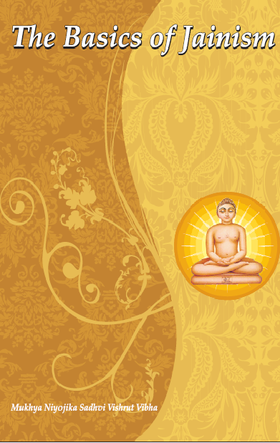Samvara means "the stoppage of influx of karma". It is the first significant factor in the process of liberation of the soul from karmic matter. Samvara is the opposite and antagonistic counter-force to ashrava (which refers to the inflow of karma into the soul) since it prevents the incoming of new karma into the soul. Using the same example, a boat (soul) with a hole allows the inflow (ashrava) of water (karma), but if the hole is sealed off, there would be no influx anymore.
Let us consider another example. A man wants to empty a pond. He works hard to remove the water from the pond, but the water level remains unchanged. This is due to fresh water continuously flowing into the pond through canals as well. To empty the tank completely he first needs to stop the inflow of water by blocking the canals. The same principle applies to our soul. Our soul is like a pond and the karmas are like water flowing into it. Ashrava is the canal through which the new karmas are continuously flowing in. Thus samvara - the stoppage of accumulation of new karmas - is the first and essential medium through which we can eventually get rid of karmas. There are five types of samvara:
- Samyaktva Samvara (right faith)
- Vrat Samvara (abstinence)
- Apramada Samvara (absence of remissness)
- Akasaya Samvara (absence of passion)
- Ayoga Samvara (absence of activity)
- Samyaktva Samvara:
Right faith" consists of a firm conviction in the truthfulness of the truth. Tranquility, desire for salvation, detachment, compassion and spiritual belief are the defining characteristics of right faith. It is possible to attain this in the fourth stage (gunsthana) of spiritual development.
- Virati Samvara:
- Apramada Samvar:
- Akasaya Samvara:
- Ayoga Samvara:
Absence of physical, mental and vocal activities consists of absence of vibration. This occurs in the fourteenth stage (gunsthana) of spiritual development.
Stopping the influx of karma can be achieved by practicing the following things-
- Samiti (carefulness in daily routine)
- Gupti (control over mind, body and vocal activities)
- Dharma (righteousness)
- Anupreksha (contemplation)
- Parisahajaya (conquest over hardship)
- Charitra (right conduct).
- Samiti:
This is the second way of inhibition of karmas.
-
Irya- careful movement in walking or restraint in movement. One needs to walk only for the purpose of performing necessary religious duties.
-
Bhasa- careful speech consists of sinless utterance.
-
Esana- proper alms begging consists of careful search for food and water that is free from blemishes. Esana Samiti is of three kinds:
-
Gavesana- examination of the acceptability of food.
-
Grahanaisana- examination of the alms itself
-
Paribhogaisana- examination of the mode of consumption of the alms received.
-
Adhana nikshep samiti- it means to be careful in receiving and keeping things after examining the place in which they are to be placed.
-
Utsarga samiti- this means to be careful in choosing a place of disposal. These samitis are not possible without gupti. Therefore, to reach the stage of liberation, aspirants need to practice samitis.
- Gupti:
This is the first way of inhibiting influx of karmic matter (samvara) by disciplining our mind, body and speech
- Kaya gupti- discipline of body
- Vaga gupti- discipline of speech
- Mano gupti-Discipline of mind
- Dharma:
This is the third way of inhibiting karmic inflow. There are ten types of dharma:
- Forgiveness
- Release from greed
- Straightforwardness
- Gentleness
- Lightness
- Truthfulness
- Self-restraint
- Penance
- Renunciation
Celibacy Practising forgiveness etc. in one's day-to-day life controls one's passions and stops the pointless activities of mind, speech and body. It leads a person to emancipation.
- Anupreksha (contemplation):
This is the fourth way of inhibiting karma. Anupreksha is a kind of meditation. There are twelve types of anupreksha i.e. concepts to meditate upon namely; impermanence, helplessness, transmigration, loneliness, distinctness of soul from body, the impurity of the body, influx of karmas, inhibition of karmas, shedding of karma, righteousness, the cosmos, and the difficulty of attaining enlightment. By practising contemplation one becomes quite detached and is able to attain the highest form of emancipation.
- Parisahajaya:
This is the fifth way of inhibiting the inflow of karmic particles. This requires enduring twenty-two parisaha (hardships): hunger, thirst, cold, heat, insect bites, nudity, boredom, women, travel, sitting and the posture for practising austerities, the sleeping place, indignation for reproach, injury caused by others, seeking alms, lack of gain, physical ailment, the touch of thorny grass, dirt, honor and reward, lack of intelligence and loss of faith. These are prescribed in order to facilitate the strict observance of the vows and the weakening of karmic bondage. One should endure all these hardships with a view to inhibiting the inflow of karma.
- Charitra (right conduct)
This is the sixth way of inhibiting karma. Charitra means to stop sinful activities by right conduct. It is necessary to reach the stage in which the inflow of karma can be stopped.
A person desirous for salvation must make strenuous efforts to gradually stop the influx of new karmic particles to the soul.
Renunciation of sinful propensities, which are of the nature of sinful activities or of internal craving. This is possible, only partially, in the fifth stage (gunsthana) of spiritual development, while in the higher stages (beginning with the sixth) it is possible in full.
Absence of remissness means having the awareness to fully engage and involve oneself in the activities of renunciation. This is possible only at the seventh stage (gunsthana) of spiritual development and persists in the higher stages.
Absence of passions means the absence of anger, pride, deceit, greed etc. This is only possible at the stage of being vitrag (dispassionate) at the thirteenth stage (gunsthana) of spiritual development.
